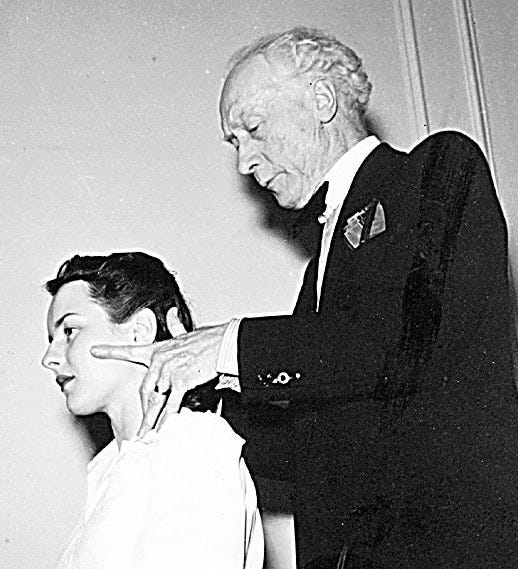The Upper Hand
The primacy of hands-on work in Alexander Technique teaching presents an interesting paradox - F.M. Alexander himself developed the Technique without any hands-on guidance.
Through patient self-observation and experimentation, he discovered fundamental principles about human coordination and behavior that has transformed the functioning of countless people over the last hundred or so years.
Yet, for most Alexander teachers today, hands-on guidance is the absolute cornerstone of teaching.
While the power of skilled hands-on work is undeniable, over-reliance on it may actually impede students' development of the most crucial skills: self-observation, conscious inhibition, experimentation, and independent problem-solving.
Consider how Alexander developed his insights. He used mirrors to observe himself and he systematically explored the effects of different ways of thinking, gradually developing a fundamental and practical understanding of how to stop miss-coordinating himself as a side effect of getting things done.
When we immediately provide hands-on guidance, we risk short-circuiting this vital process of self-discovery. Students can become too dependent on the teacher's touch to find better coordination, rather than developing their own tools for observation and change. This creates a problematic dynamic where students progress during lessons but struggle to maintain improvements on their own.
Additionally, hands-on work can inadvertently reinforce the idea that improved use is something given by the teacher rather than discovered by the student. This subtle shift in agency may explain why some students remain passive in their learning, waiting for the teacher to "fix" them rather than actively engaging in their own process of change.
There's also the question of whether heavy reliance on hands-on teaching accurately reflects Alexander's core insights about the role of conscious agency in coordination. If improved Use primarily depends on inhibition and direction, shouldn't our teaching methods emphasize these mental processes rather than hands-on kinesthetic guidance?
Of course, I'm not suggesting we should abandon hands-on work. As we know, just for starters it...
Builds trust and safety while dramatically accelerating learning.
Helps students overcome unreliable body awareness.
Makes mind-body connections tangible and practical.
Creates a robust kinesthetic dialog between teacher student.
Develops lasting proprioceptive skills.
Creates transformative learning experiences of improved Use with instant feedback.
Rather, after teaching exclusively HandsFree over the past 20 years, I've come to the conclusion that both Alexander students and teachers benefit greatly from finding a balance between teaching with hands-on guidance and teaching students how to skillfully experiment on their own.
That way, they get the best of both worlds: the amazing advantages that skilled one to one kinesthetic guidance provides coupled with the increased opportunity for structured self-discovery and empowerment that are at the heart of a HandsFree learning system like Primal Alexander™.
After all, if Alexander could make his discoveries without hands-on guidance, and we take him at his word when he said:
"Anyone can do what I did but they would have to have done what I did."
Shouldn't we be trying to find even more ways to help our students develop similar capabilities for experimentation and self-observation so that they can take even greater advantage of the transformational power of Alexander's amazing discoveries?




